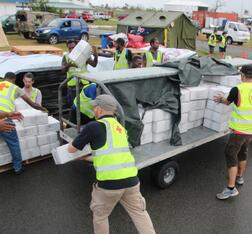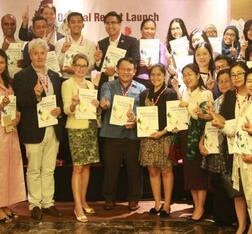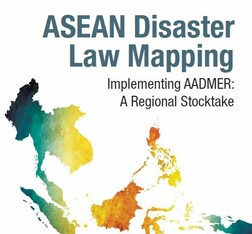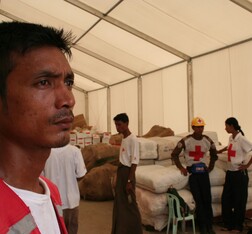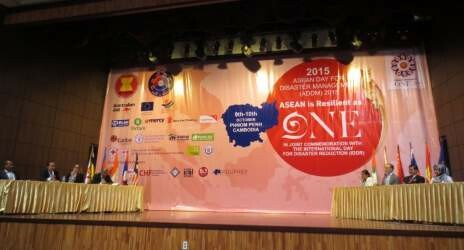
Under the theme “ASEAN is resilient as one”, key actors in the region took to the stage to highlight the progress being made in disaster management, risk reduction and response. The celebrations were led by the Cambodian National Committee for Disaster Management, and marked a particularly significant year for Cambodia, which recently adopted a new disaster management law.
His Excellency Mr. Ross Sovann, current chair of the ASEAN Committee for Disaster Management (ACDM), spoke about the importance of having a strong regional and national approach to disaster risk management. “The AADMER [ASEAN agreement for disaster management and emergency response] is the backbone of regional collaboration, and we must enact national legislative measures to implement it - this is fundamental”, he explained. “We are the most resourceful region when it comes to knowledge and experience of disasters, because we face them all the time….but without law, we don’t have a platform to support our activities.”
The IFRC was invited to deliver a presentation on disaster law developments across the region as part of the high-level panel and thematic discussions. The presentation highlighted that many countries are reviewing existing disaster laws or developing new ones, including in the Philippines, Lao PDR and Indonesia. Others, like Vietnam and Myanmar, are focusing on implementation. In addition to outlining the significant progress made, discussions focused on the importance of raising awareness of relevant laws and frameworks at all levels, and the need for better implementation.
These sentiments were echoed by senior officials from ASEAN institutions, including Ms. Adelina Kamal, Head of Disaster Management at the ASEAN Secretariat, and Mr. Said Faisal, Executive Director of the ASEAN Coordinating Centre for Humanitarian Assistance (AHA Centre). “Law and policy is important as an umbrella”, explained Mr Faisal, “but we need policy with execution”.
The NCDM and Cambodia Red Cross will be working together to disseminate the new law, with a focus on community level implementation. Dr. U Sam Ath, Head of Disaster Management at Cambodia Red Cross, affirmed this commitment. “Cambodia Red Cross strongly supports disseminating the new disaster management law at all levels, together with the NCDM”, he stated. “Disasters happen at the grassroots level, so we need to make sure the new law is disseminated and understood by communities, because this is where the action happens”.
During the event, participants also considered the need for an increased focus on risk reduction, in addition to traditional response-focused actions. “We need to change our mind-set from response and relief, to think about reducing risks and how to mainstream this into all aspects of our work”, stated Mr. Sovann. “The new law in Cambodia highlights the importance of mainstreaming disaster risk reduction into our development planning”.
When it comes to disaster risk reduction, “it is not a sprint”, explained Ms. Kamal, “it is a marathon. And endurance is more important than speed”.
It will be an interesting year ahead with the chairmanship of ACDM being handed over to Indonesia in 2016, and a new work programme being developed to support ongoing implementation of the AADMER. When speaking about the importance of effectively implementing the AADMER, including through the development of national legislation, Ms. Kamal explained that “it is the member states who commit to the agreement. Our disaster management communities. The different elements of our societies. Our law makers. It is for the whole country”.
There is no doubt that the capacity and independence of ASEAN as a region is growing, despite (or perhaps because of) the numerous disasters they constantly face. “We in ASEAN can increasingly handle things ourselves when it comes to response and reducing risks”, stated Ms. Kamal. “We work together to translate our knowledge and experience into action. This is resilience”.
